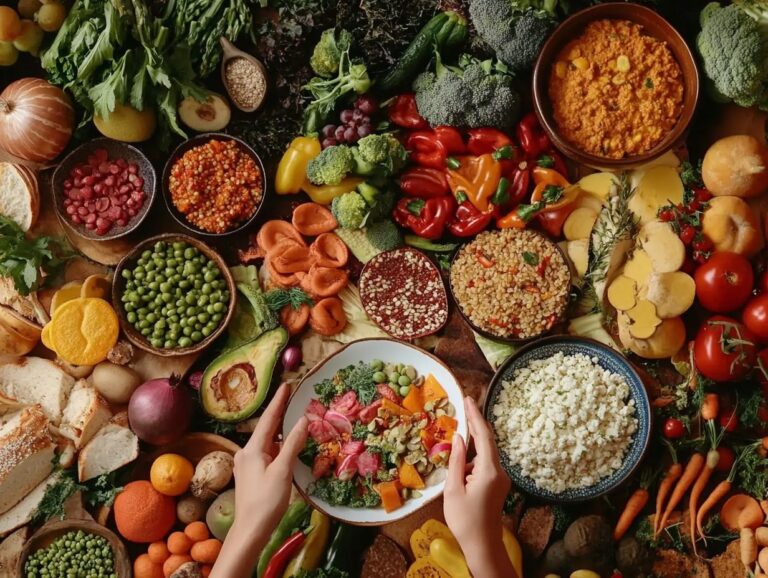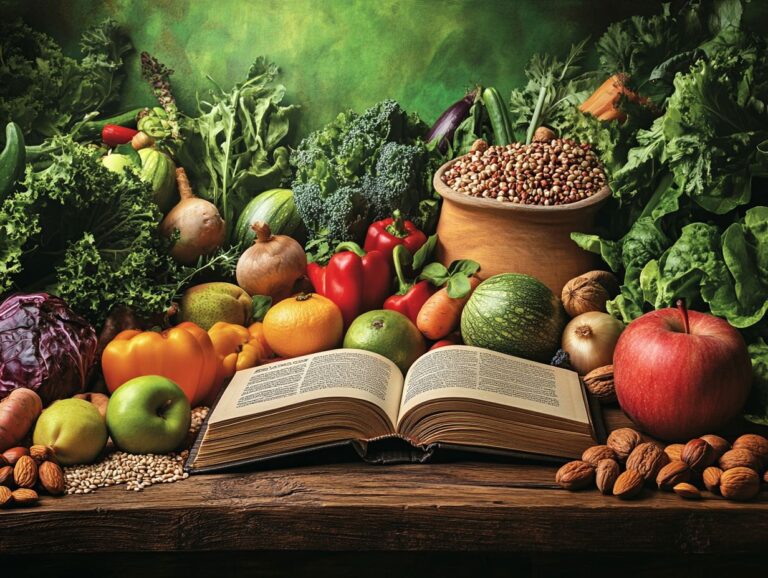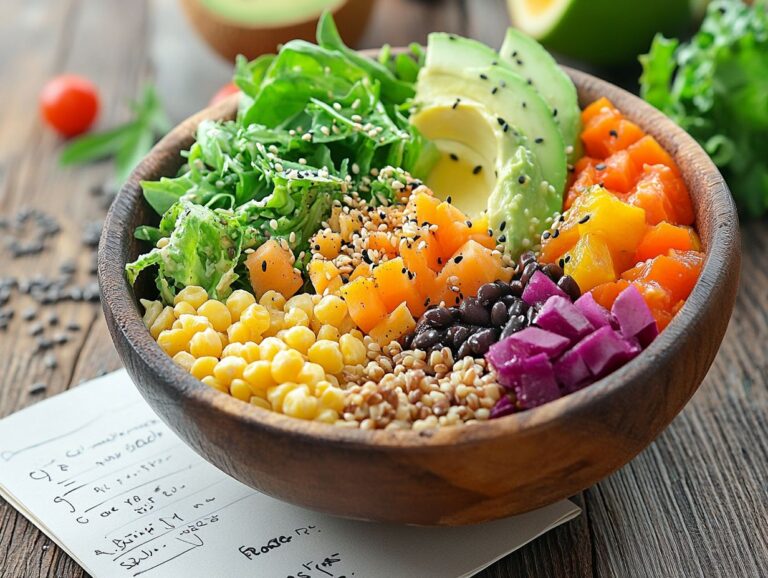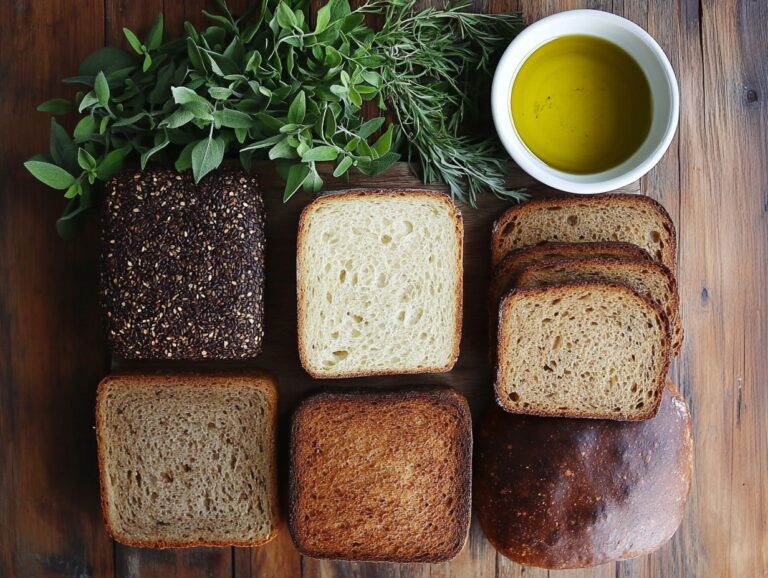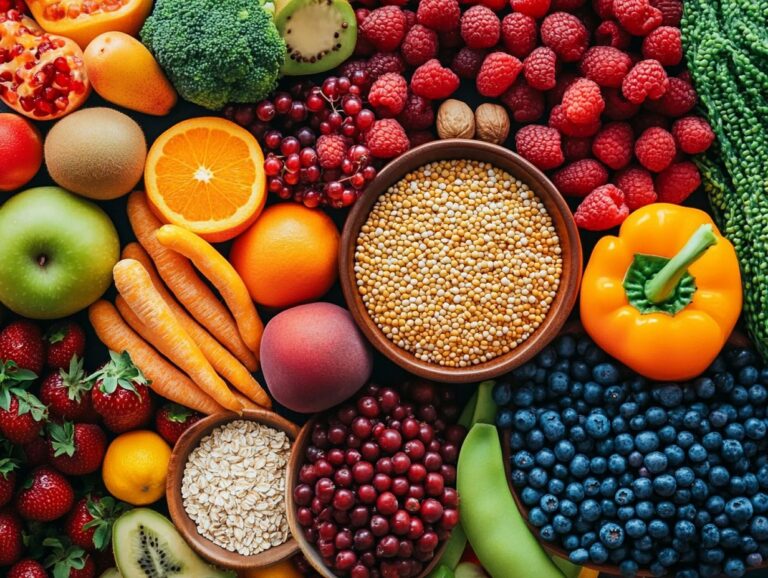This article explores how to gain weight while enjoying the numerous benefits of a vegan lifestyle, including increased nutrient intake, reduced risk of chronic diseases, and a lower environmental impact. It provides practical tips and strategies, along with high-calorie food options, to assist individuals aiming to gain weight in achieving their goals. Whether you are transitioning to veganism or looking to modify your current plant-based diet, this article offers all the information you need to thrive.
Key Takeaways:
- Yes, you can gain weight on a vegan diet by increasing calorie intake, incorporating healthy fats and proteins, and eating frequently.
- Some high-calorie vegan foods include nuts and nut butters, avocado, quinoa, brown rice, and coconut milk.
- Tips for gaining weight on a vegan diet include listening to your body, incorporating resistance training, staying consistent, and seeking professional help if needed.
Can You Gain Weight on a Vegan Diet?
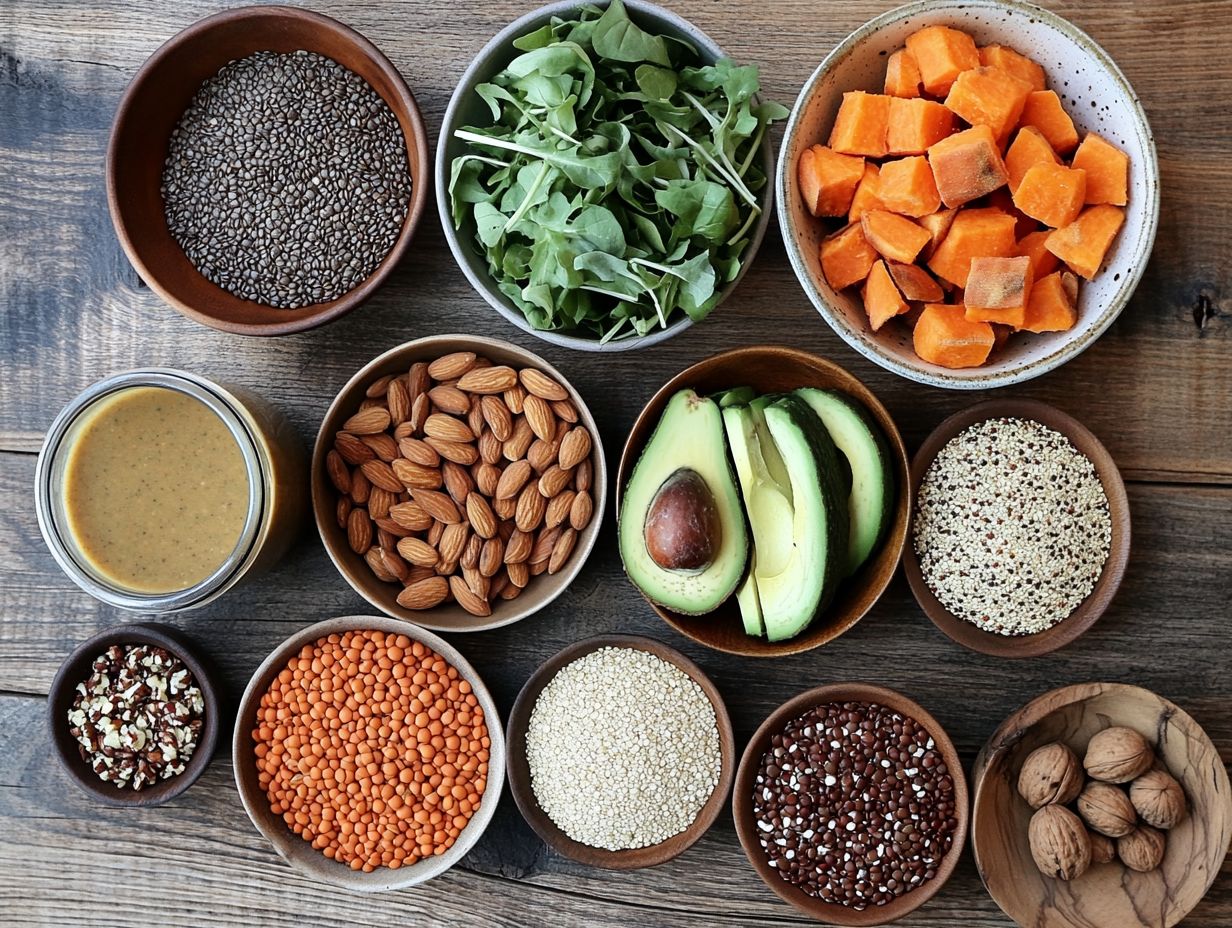 Yes, it is possible to gain weight on a vegan diet, provided you understand caloric intake and the nutritional components of plant-based foods, including their caloric density and nutrient-dense properties. A well-planned vegan diet can enable individuals to achieve a positive caloric balance by focusing on higher-calorie foods and incorporating sufficient nutrient-dense items into their meal planning. By taking into account factors such as body type and metabolic rate, it is possible to structure a diet that promotes healthy weight gain without sacrificing nutrition or health benefits. Utilizing tools like a calorie counter can help track calorie intake more effectively.
Yes, it is possible to gain weight on a vegan diet, provided you understand caloric intake and the nutritional components of plant-based foods, including their caloric density and nutrient-dense properties. A well-planned vegan diet can enable individuals to achieve a positive caloric balance by focusing on higher-calorie foods and incorporating sufficient nutrient-dense items into their meal planning. By taking into account factors such as body type and metabolic rate, it is possible to structure a diet that promotes healthy weight gain without sacrificing nutrition or health benefits. Utilizing tools like a calorie counter can help track calorie intake more effectively.
What Are the Benefits of a Vegan Diet?
A vegan diet offers several benefits, including enhanced personal health, improved environmental sustainability, and reduced rates of chronic diseases. The health benefits of a vegan diet also include reducing negative health outcomes associated with high meat consumption. By emphasizing nutrient-dense plant foods, a vegan diet can significantly improve overall health, as evidenced by data from “The Game Changers” documentary, the research conducted by clinical dietitian Gena Hemshaw, and insights from the National Academy of Sports Medicine doctors. Athletes, particularly plant-based athletes, have showcased significant performance improvements through a well-planned vegan diet. These advantages not only contribute to individual well-being but also pave the way for a healthier future for everyone. A well-maintained vegan diet can also prevent unexpected weight loss by ensuring balanced nutrient intake.
1. Increased Nutrient Intake
The key benefits of a vegan diet include an increased intake of nutritious foods that are rich in vitamins, minerals, and fiber. A variety of plant-based foods, such as legumes, whole grains, fruits, and vegetables, ensures that a person’s diet contains essential nutrients needed for good health, including protein, iron from legumes, calcium, and vitamins A and C from leafy vegetables. However, the full benefits of a vegan diet can only be realized through effective meal planning. Balancing different food groups helps prevent deficiencies in important nutrients, such as vitamin B12 and omega-3 fatty acids, which are often lower in plant-based diets. Additionally, pairing foods, such as nuts with fruits, enhances nutrient absorption while also improving taste and satisfaction. Incorporating fat shakes made from healthy fats like avocado and almond butter can also be beneficial. Ultimately, a well-balanced and thoughtfully planned diet promotes a healthy and sustainable lifestyle.
2. Lower Risk of Chronic Diseases
Research indicates that individuals who follow a vegan diet have a lower risk of chronic diseases, including heart disease, diabetes, and certain types of cancer. This reduced risk is likely attributed to the increased consumption of fiber-rich plant foods, which promote cardiovascular health and overall well-being. In addition to fiber-rich foods, the inclusion of whole food groups like legumes and leafy greens helps ensure a balanced diet. Experts explain that incorporating a variety of whole grains, legumes, fruits, and vegetables not only enhances nutrient intake but also provides a wide range of antioxidants and phytochemicals. These compounds have been shown to reduce inflammation and oxidative stress, both of which are closely linked to chronic diseases. Studies have demonstrated that those who prioritize whole foods over processed foods within a vegan diet experience even greater benefits, resulting in improved metabolic health. Regular exercise intensity combined with a well-planned diet further enhances these health benefits.
3. Better for the Environment
Vegan diets are beneficial for both individual health and the environment. By consuming fewer animal products, we can significantly reduce greenhouse gas emissions, land use, and water consumption, making plant-based foods a more sustainable choice. Calorie-rich plant foods also contribute to this sustainability by providing efficient energy sources with lower environmental impact. Studies have shown that adopting a vegan lifestyle can greatly decrease a person’s carbon footprint. For instance, a 2018 report from the University of Oxford indicated that global food-related emissions could be reduced by as much as 70% by 2050 if everyone transitioned to a plant-based diet. The production of plant-based foods typically requires fewer resources; for example, it takes 1,800 gallons of water to produce just one pound of beef, compared to only 216 gallons for a pound of vegetables. Therefore, a vegan diet can contribute to mitigating climate change while conserving vital resources for future generations.
How to Gain Weight on a Vegan Diet?
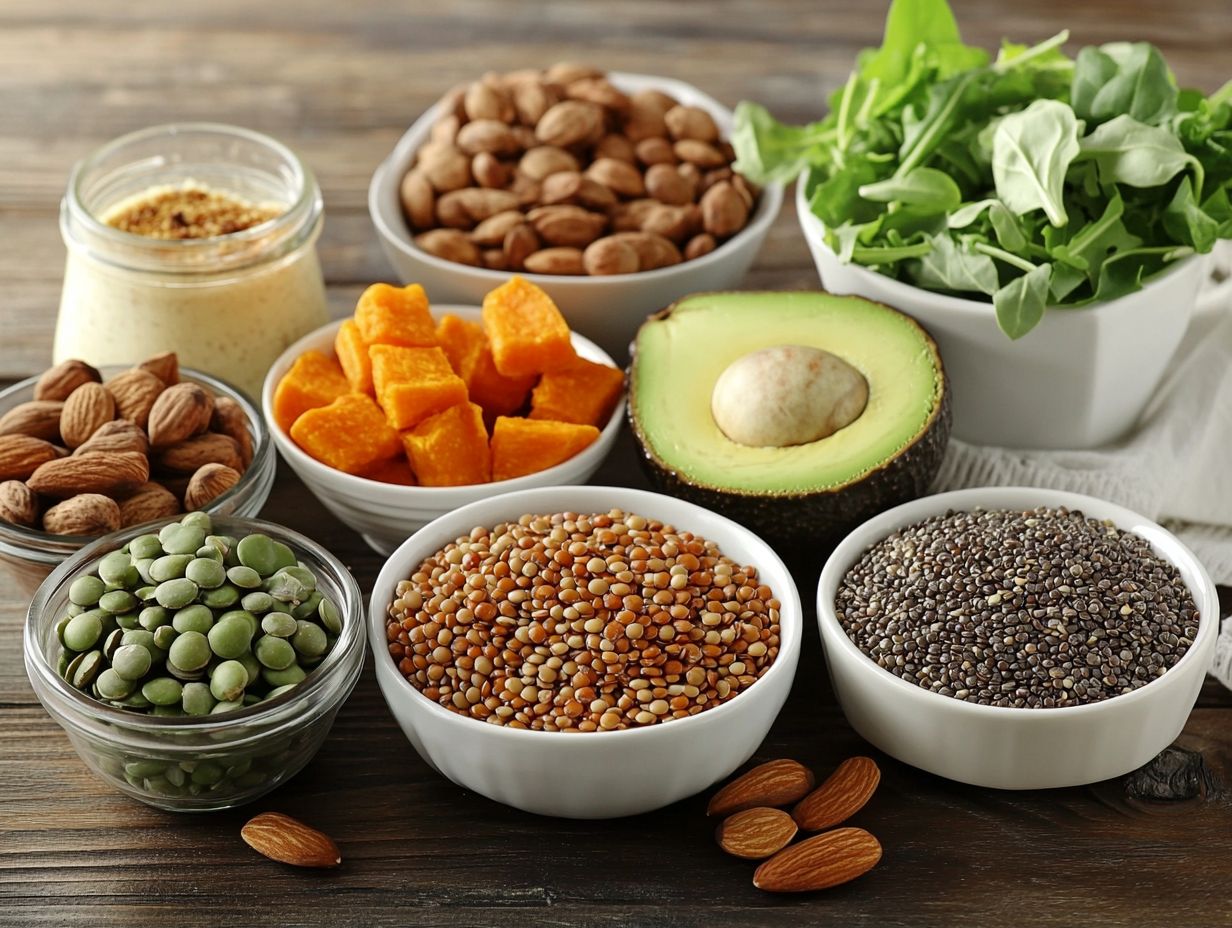 It is possible to gain weight on a vegan diet with careful planning and an understanding of how to increase calorie intake without compromising nutrition. By incorporating calorie-dense foods, adjusting portion sizes, and developing a balanced meal plan that includes protein-rich ingredients and healthy fats, you can effectively promote muscle mass and enhance overall health while following a vegan lifestyle. Including soy products like tofu and tempeh can also increase protein intake.
It is possible to gain weight on a vegan diet with careful planning and an understanding of how to increase calorie intake without compromising nutrition. By incorporating calorie-dense foods, adjusting portion sizes, and developing a balanced meal plan that includes protein-rich ingredients and healthy fats, you can effectively promote muscle mass and enhance overall health while following a vegan lifestyle. Including soy products like tofu and tempeh can also increase protein intake.
1. Increase Calorie Intake
To gain weight on a vegan diet, you need to consume more calories than your daily caloric requirements. Achieving weight gain requires a positive caloric balance, which involves eating more calorie-dense foods and increasing portion sizes. Foods such as nuts and seeds are excellent options for this purpose; for example, almonds, walnuts, chia seeds, and flaxseeds are all calorie-dense options. Avocados are another fantastic addition to a weight-gain diet, as they are creamy, delicious, and packed with healthy fats. Additionally, incorporating oils like olive oil, coconut oil, or avocado oil into your cooked meals is an easy way to boost the calorie content of your dishes. If you want to enjoy your favorite recipes, consider enhancing meals by adding nut butter to smoothies or increasing serving sizes to elevate calorie intake while maintaining balanced nutrition. Using tools like Calorie King can assist in managing your daily caloric intake.
2. Focus on Whole Foods
Whole foods play a crucial role in gaining weight on a vegan diet because they are generally more nutrient-dense and offer a wider range of vitamins and minerals. Consuming a variety of plant-based foods, such as whole grains, fruits, and vegetables, ensures a balanced intake while supporting healthy weight gain. Foods like quinoa, brown rice, and oats provide complex carbohydrates that supply sustained energy. They are also high in fiber, which aids digestion and promotes a feeling of fullness. Incorporating protein powder into these meals can further enhance their nutritional value. Incorporating healthy fats from whole food sources such as avocados, nuts, and seeds can enhance calorie intake without significantly increasing meal size. Additionally, legumes like lentils and chickpeas serve as important sources of protein, helping to meet overall macronutrient needs.
3. Incorporate Healthy Fats and Proteins
Many people are unaware of the vital role that healthy fats and protein-dense foods play in a vegan diet. Nuts, seeds, avocados, and plant-based protein powders are primary sources of healthy fats and proteins in a vegan diet, which can aid in weight gain and muscle mass development. These foods promote healthy weight gain by increasing nutritional intake and helping individuals feel fuller for longer. For instance, a meal of quinoa with black beans and avocado is an excellent choice for boosting overall protein and healthy fat intake, making it ideal for muscle gain. Healthy snacks such as chia seed pudding and nut butter on whole-grain toast effectively meet protein needs. Additionally, the fatty acids found in walnuts and flaxseeds may support recovery by reducing inflammation and enhancing overall health, which is crucial for muscle development. Dietary supplements such as vitamin D, creatine, and glutamine can also be considered to support overall fitness goals.
4. Eat Frequently
Eating multiple times throughout the day can significantly impact calorie intake and contribute to weight gain on a vegan diet. Incorporating healthy snacks and mini-meals into your meal plan can help you increase your calorie consumption without always feeling overly full. To achieve this balance, consider larger portion sizes during main meals, opting for filling foods such as quinoa, legumes, and avocados. Nutrient-dense snacks that are easy to grab, like trail mix (a combination of nuts and dried fruits) or hummus with whole grain crackers, can also be beneficial. Establishing a routine around mealtimes is important to prevent unintentional weight loss; being aware of hunger cues and eating even when you don t feel hungry ensures that weight loss does not inadvertently occur while trying to gain weight on a vegan-friendly diet. Regularly adjusting meal portions and considering the inclusion of maca powder in your diet can further aid in achieving your weight gain goals.
What Are Some High-Calorie Vegan Foods?
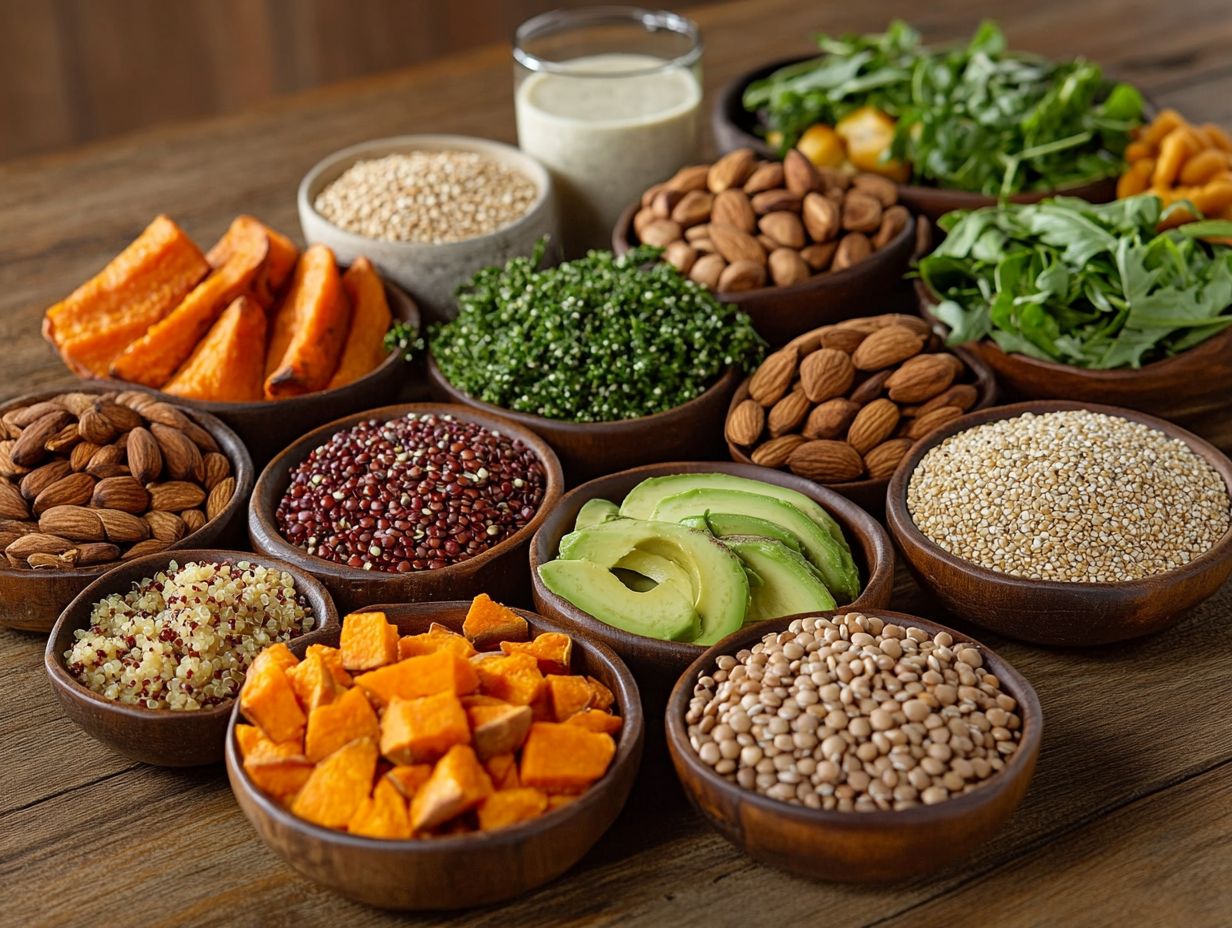 The most effective foods for gaining weight on a vegan diet are those that are high in calories, as they supply the energy necessary to meet the body’s caloric needs and create a positive caloric balance. Utilizing tools like Active.com for fitness advice can help balance dietary intake with exercise regimens. Among the best options for increasing weight on a vegan diet are:
The most effective foods for gaining weight on a vegan diet are those that are high in calories, as they supply the energy necessary to meet the body’s caloric needs and create a positive caloric balance. Utilizing tools like Active.com for fitness advice can help balance dietary intake with exercise regimens. Among the best options for increasing weight on a vegan diet are:
- Nuts
- Seeds
- Avocados
- Calorie-dense whole grains like quinoa and brown rice
1. Nuts and Nut Butters
Nuts and nut butters are among the most popular high-calorie vegan foods, providing an excellent source of healthy fats and protein-rich nutrients essential for weight gain. Walnuts, Brazil nuts, and almond butter are particularly nutrient-dense options. They are versatile and can be enjoyed in various forms. With a wide variety of nuts available, everyone can find their favorite, whether it s almonds, cashews, peanuts, Brazil nuts, or macadamia nuts. Each type of nut boasts its own unique flavor and nutritional profile, with almonds being particularly high in vitamin E and walnuts rich in omega-3 fatty acids. Nut butters, which can be creamy or crunchy, such as almond butter, are delicious when spread on whole-grain bread, added to oatmeal, or blended into smoothies. The best way to enjoy nuts and nut butters, including nuts and seeds like chia seeds, is by using them as toppings for salads or yogurt, making them the perfect healthy snacks at any time.
2. Avocado
Avocado is an excellent high-calorie food choice for those following a vegan diet, celebrated for its healthy fats and nutrient density. This versatile fruit can be incorporated into a variety of dishes, making it a staple for meals aimed at healthy weight gain. Rich in monounsaturated fats, avocados promote heart health and provide essential vitamins such as K, E, C, and several B vitamins. Incorporating this nutrient powerhouse into daily meals is both enjoyable and beneficial, enhancing the nutritional void in many diets. For example, blending ripe avocados into smoothies creates a creamy texture while enhancing the drink s nutritional profile. In salads, adding avocados not only boosts flavor but also aids in nutrient absorption from other ingredients. Additionally, avocados make a delicious spread for toast or sandwiches, allowing you to savor their rich taste while maximizing health benefits in every bite.
3. Quinoa
Quinoa is a high-calorie vegan food that offers a relatively high protein density and serves as a nutrient-dense base for meals. It provides essential amino acids that support muscle building and overall health. As a fiber-rich and protein-dense option, it is ideal for a balanced diet. As a complete protein, quinoa is also rich in dietary fiber, which promotes digestive health and helps individuals feel full, making it one of the best high-calorie vegan foods for adding calories in a healthy manner. The caloric density of quinoa makes it particularly useful for those needing to increase their calorie intake. Quinoa can be incorporated into meals in simple yet delicious ways. For example:
- A quinoa salad with roasted vegetables and olive oil makes for an easy meal, providing both healthy fats and essential nutrients.
- A hearty quinoa and black bean chili is an excellent option for a healthy and satisfying dinner, packed with plant-based proteins and fiber-rich ingredients.
- A quinoa breakfast bowl topped with fresh fruit, nuts, and honey is a delightful way to start the day.
4. Coconut Milk
Coconut milk is a high-calorie dairy substitute that complements a plant-based diet, providing healthy fats that contribute to overall calorie intake for weight gain. Its creamy texture and flavor make it a versatile ingredient that can be incorporated into a wide variety of recipes and smoothies. This dairy alternative enhances both the nutritional value and flavor of dishes, whether sweet or savory. For instance, when added to smoothies, coconut milk pairs beautifully with tropical fruits like mango and pineapple, resulting in a rich texture and delightful flavor. In savory dishes, it adds creaminess to meals such as chickpea curry or lentil dahl, giving a tropical twist to traditional curry recipes. Additionally, coconut milk can enhance breakfast dishes like oatmeal or chia pudding, making them creamier and more filling. Its high-caloric nature and energy-dense profile make it an excellent addition to a nutrient-dense plant-based diet.
What Are Some Tips for Gaining Weight on a Vegan Diet?
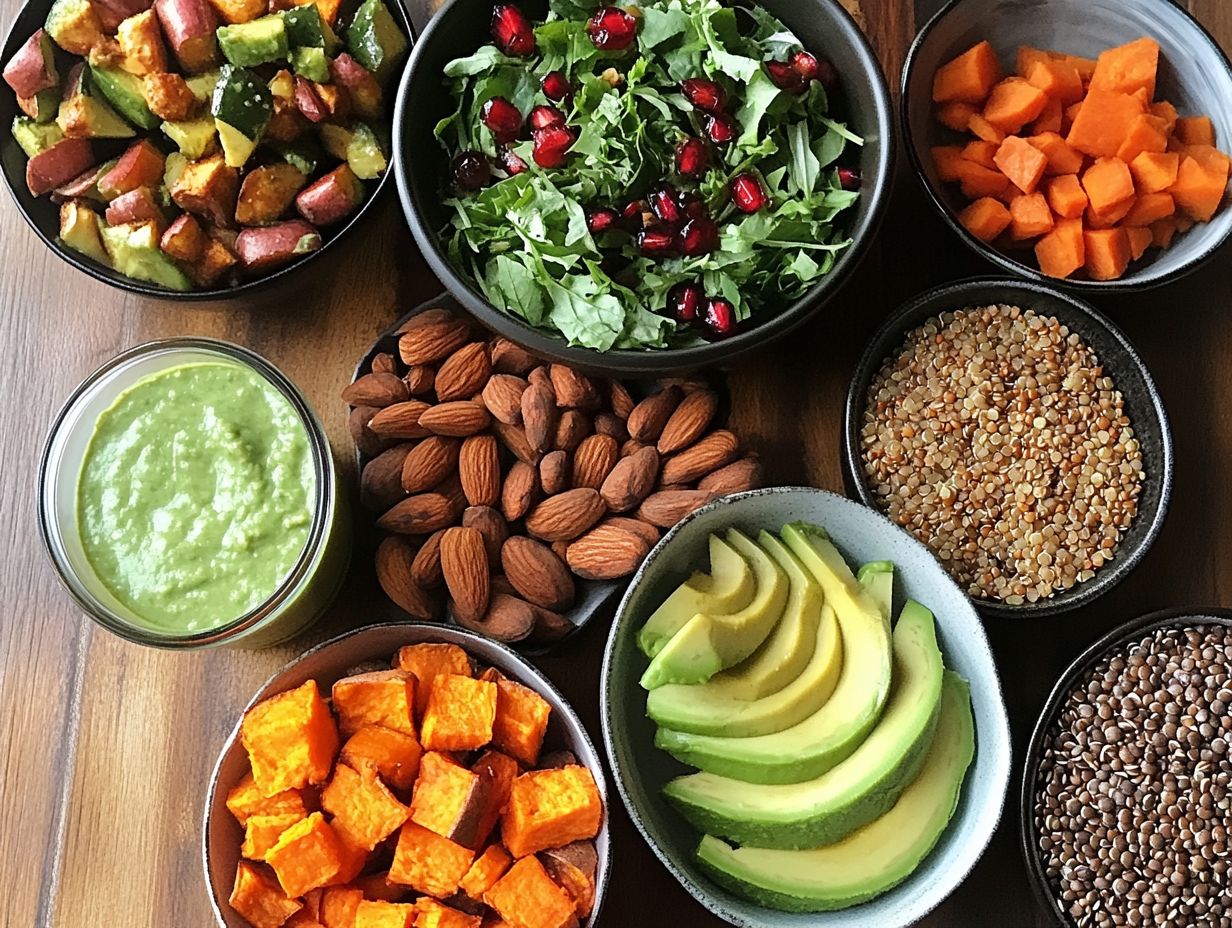 You can gain weight on a vegan diet by implementing several strategies, including:
You can gain weight on a vegan diet by implementing several strategies, including:
- increasing meal frequency,
- incorporating resistance training,
- seeking professional assistance with your meal plan and exercise regimen, such as consulting resources like The Game Changers or Gena Hemshaw for more tailored advice.
1. Listen to Your Body
Listening to your body is crucial for gaining weight on a vegan diet, as it helps you understand your individual caloric needs and adjust meal portions accordingly. This practice promotes mindful eating and ensures that you achieve your weight gain goals in a healthy way, avoiding negative health outcomes. Recognizing hunger cues can significantly enhance meal satisfaction and prevent overeating. Physical signals such as a rumbling stomach or feelings of low energy may indicate that it s time to eat. Additionally, being aware of your emotional state can help you discern whether your desire to eat stems from genuine hunger or psychological triggers. When tracking your progress, using tools like a calorie counter can be beneficial. Pay attention to how different portion sizes affect your body aim for satisfaction without feeling overly full. If you frequently find yourself still hungry after meals, consider gradually increasing your portion sizes, focusing on nutrient-dense foods like avocados or legumes to help you meet your caloric targets. Conversely, if your clothes feel too tight or you experience discomfort, it may be necessary to slightly reduce your portions, but ensure that any adjustments remain sustainable and aligned with your unique health journey.
2. Incorporate Resistance Training
Resistance training is a crucial component of a weight gain plan for those on a vegan diet, as it promotes muscle mass development alongside dietary interventions. Exercises that adequately overload the muscles, such as those recommended by the National Academy of Sports Medicine, are essential for stimulating growth and achieving weight gain goals. While resistance training builds strength, it also enhances metabolism, allowing the body to use nutrients more efficiently. To maximize these benefits, it is important to incorporate exercises such as squats, deadlifts, bench presses, and rows, which stimulate multiple muscle groups. Increasing exercise intensity can also further stimulate muscle growth and calorie utilization. A balanced exercise program that includes both compound and isolation exercises, combined with a calorie-dense and nutrient-rich diet, can yield optimal results. Additionally, recovery and muscle building are supported by including protein, healthy fats, and carbohydrates in a nutrient-dense vegan diet to help achieve weight gain objectives. This approach is particularly beneficial for a plant-based athlete aiming to increase muscle mass.
3. Stay Consistent
Consistency is crucial for achieving healthy weight gain on a vegan diet, as it helps ensure regular caloric intake and adherence to the prescribed meal plan. Establishing a routine reinforces healthy habits and supports weight gain objectives, helping to avoid unexpected weight loss. To maintain this consistency, it is important to have a structured meal and workout schedule. Incorporating meal preparation into your weekly routine provides easy access to nutritious foods, making it simpler to meet calorie goals. Consider planning your meals a week in advance, including a diverse array of plant-based proteins, healthy fats, and complex carbohydrates. Utilize cooking oils like coconut oil and olive oil to boost caloric density. When combined with a consistent exercise regimen that incorporates both resistance training and cardiovascular workouts, this approach can significantly aid in reaching your targets. Additionally, keeping a food diary or using calorie tracking apps like Calorie King can help you monitor calorie intake and make necessary adjustments to ensure that every bite aligns with your weight gain goals.
4. Seek Professional Help if Needed
If you are still struggling to gain weight on a vegan diet after implementing all the previous tips, seeking professional assistance may be beneficial. Dietitians and nutritionists can offer valuable insights into dietary supplements and other resources that can help you achieve your healthy weight gain goals. They might recommend protein powder, creatine, glutamine, or maca powder as supplements to enhance your diet. These professionals can provide individualized meal planning and help you understand the importance of specific nutrients that are essential for healthy weight gain. For instance, protein powders, omega-3 fatty acids, and vitamin D are dietary supplements that can complement a vegan diet and may be necessary to address any nutritional gaps. Experts can also assist in tracking your progress, making necessary dietary adjustments, and providing motivation. Personalized advice can help individuals aiming to gain weight transform dietary changes into a successful and sustainable process. They can help manage calorie tracking, meal plan adjustments, and strategies to ensure a positive caloric balance.
